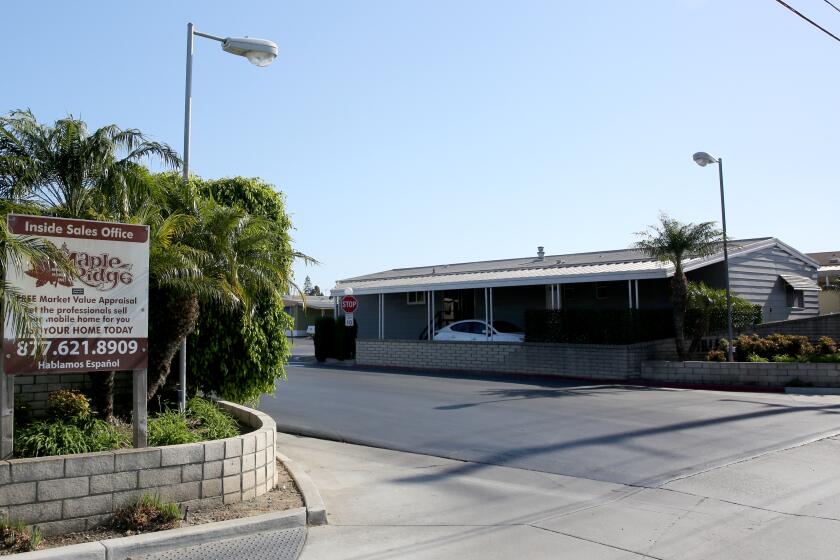Getting his kicks: Newport Coast karate instructor beloved in community

- Share via
Newport Coast karate instructor David Crockett said he is a descendant of, yes,19th-century politician and frontiersman Davy Crockett.
“The current generation of kids don’t even know who he is anymore,” said David Crockett, 72, who was just a toddler when the 1955 Disney film about Davy Crockett was released. “I’m OK with that.”
David Crockett may not be the “King of the Wild Frontier” as Disney dubbed his predecessor, but the Newport Coast Community Center is certainly his domain.
The highly decorated black-belt sensei has been teaching there for more than a decade and become beloved in the community.
He teaches his Itosu-kai style of karate there multiple days a week to people of all ages through the Newport Beach Recreation and Senior Services Department.

At a class last week, the last before a short break for Christmas, Crockett greeted the children in the intermediate class with a sense of humor.
One girl didn’t have a partner for a drill. He jokingly told her to go home.
“We do 80% serious and 20% fun,” Crockett said of the intermediate class, adding that the beginner class is probably closer to 50-50. “What we’re trying to teach is integrity and honesty. You’re not born with those things, you have to learn them. Karate has that in it, so if you get the kids to stay long enough, they can get it.”
Some of the teenagers in the class have red belts, which Crockett said is the equivalent of a black belt for the junior ranks. They also train with some of the adult black belts between classes.
“That way, the kids start to assimilate with adults, instead of the shock when they go from junior to adult,” Crockett said. “They say, ‘Oh yeah, I remember, I trained with this guy before.’ They’re not so intimidated. A lot of these kids have adult rankings too, because they’ve been training for so long.”
Noah Chen of Newport Coast, 12, has been training with Crockett since he was 5.
“Every day I go in and I come out a better person,” Noah said. “It teaches you about manners and how to have good resilience and stuff.”

Ava Fahim of Irvine will be attending University High School next year, and she believes the lessons she’s learned through Crockett’s dojo have helped her as she prepares for high school.
She also plays volleyball, and the push-ups she sometimes does for discipline in the dojo have helped her arm strength.
“I feel like now I can show myself as a better person,” said Ava, 14. “I learned a lot of integrity, which I wasn’t big on when I was little, but it’s grown on me.”
Crockett, who lives in Laguna Niguel, also started Itosu-kai karate locations in Long Beach and Dana Point. He gave the one in Dana Point to student Katie Hanten, a black belt, in 2019.
Hanten has also been training in karate since she was 5, with breaks when life got in the way with three shoulder surgeries and going back to school to pursue a master’s degree.
“It’s good, positive, character building,” she said. “We all kind of try to reward good character. That’s mostly what it’s about.”
Crockett is much more serious with his advanced classes, and he goes to Japan every year to meet with his teacher, Sadaaki Sakagami.

“Today in America, they [mix styles] a lot, but we’re very traditional,” he said. “I teach it very strict … To get from beginner to black belt, it’s going to take you six years, where at another school you might do it in three.
“With the adults, it’s hard training. Your body hurts, you had a long day at work, and still we expect the same every day. Credit to these people who keep coming. I never stopped because I was too weak. I knew if I stopped, I wouldn’t be strong enough to come back. That’s what is really hard, if you get out of the routine.”
Classes begin and end with a time of meditation, called “mokuso.” In between, students practice “katas” — a pattern of movements that they not only have to memorize but know the meaning of as well.
Some of the katas have dozens of moves, so repetition is crucial, which will also help the students as they advance. They also learn “kihon” (the basics) and “kumite” (controlled fighting).
Crockett also teaches his younger students honesty. One of the drills involves jumping over a karate belt. If they touch the belt with their foot, they’re out and must go do 10 push-ups.
Crockett says nothing; it’s the student’s responsibility to admit his or her mistake.
“It’s very difficult to do what sensei does with kids,” said Rassam Taherzadeh, a black belt who is Crockett’s assistant. “The way he teaches is serious, and he also keeps it interesting. What I think is most important that sensei emphasizes is respect and responsibility. When the kids learn those two, it’s very valuable for them.”

Crockett, who was a consultant for and stuntman in the original “The Karate Kid” movie in 1984, is in it for the long haul. He came up training with legendary figures like Chuck Norris and Billy Blanks.
Now his headquarters are in a nondescript community center in Newport Coast, but the 150 students training in the dojo feel right at home there.
“He upholds a tradition from Japan that not a lot of people uphold in the United States, which is really cool,” Hanten said. “I think it’s honorable that he sticks to the tradition. Not a lot of people do that, for a lot of different sports and arts.
“The stereotype at a karate dojo or taekwondo is breaking blocks and lots of yelling. I’d say it’s more serious here. It’s good that he keeps it really technical. A lot of us have gone to Japan, and we can fit right in. I went a year and a half ago, and it was like I was here. He teaches very parallel.”

All the latest on Orange County from Orange County.
Get our free TimesOC newsletter.
You may occasionally receive promotional content from the Daily Pilot.




